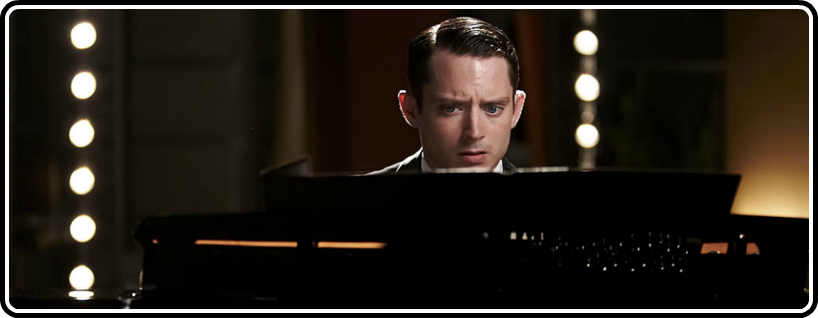
Pressure cooker thrillers with a dash of high concept are often an exercise in narrative self-constraint which can ideally and conversely push the filmmaker(s) to think outside the box. Grand Piano falls into that category, carrying its preposterousness out with commitment and confidence while astutely making music the center of all things. Literalizing the pressures of a concert pianist to play perfectly and an untouchable tautness at seventy-five minutes keeps the film going even as it gradually deflates before our very eyes.
A grand piano once owned by the deceased mentor of genius pianist Tom Selznick (Elijah Wood) ushers us into the story as it is hauled to the venue Tom will be performing at that night. After very publicly failing to complete a notoriously difficult piece of music five years before, Tom is reluctantly set to take the stage for the first time since. Racked with stage fright and generally irritable at the prospect of performing (the comeback was his starlet wife’s idea, not his), he nevertheless takes the stage only to be presented with something far worse than the prospect of artistic failure.
At the concert’s start, Tom sees that his sheet music is noted with threats in red marker which state he and his wife’s life are in danger if he plays a single wrong note during the concert. Tom eventually acquires an earpiece and talks to the sniper assailant (John Cusack) while being forced to flawlessly perform.
The strong first act set-up combines self-aware exposition dumping and the palpable anxiety radiating from Tom by making him, and us, feel like we are playing catch-up; like everything is happening a beat too fast. That sprinting quickness comes through as his transportation plans change last minute and he hurriedly gets changed in the limo while dealing with an aggressive phone interview. That first-act professional anxiety is amped up that much more once Tom realizes the kind of trouble he’s in.
The sweeping camera amplifies the distance between Tom and his audience (and assailant) by bridging the two. An exhilarating pace structured around music and a darting and fidgety Elijah Wood keeps Grand Piano eminently watchable. The template stimulates some inventiveness in sustaining real-time tension and is bolstered by elongated framing and shout-outs to giallo in its use of red and green. A welcome supporting turn by Alex Winter adds the bulgy-eyed lurking menace that John Cusack’s gravelly voice (I actually forgot it was him until two thirds of the way in) can only aurally represent.
Then the generic contrivances through the B-movie guise start to show themselves, and not even the film’s rushed swiftness can cover them up. In order to fill out the runtime and keep the conversation between Tom and his assailant going, the sniper attempts to psychologically attack the pianist using his professional failure, his marriage and his wife’s success. But they are empty attempts with no clout, and nonsensical in the notion that the antagonist needs Tom to be focused on his playing. Speaking of Emma’s (Karry Bishe) success, she ends up sitting in a theater box the whole film, her starlet status set up and left to fizzle. Two supporting characters are awkwardly established as future fodder. Even the mostly lovely camerawork is at times distracting in its digital artificiality, and a De Palma split screen homage feels played out on sight. All of this leads to a mano-a-mano showdown we’ve seen countless times before.
Grand Piano blends the lonely arduousness artists of the musical persuasion may feel and the isolated-in-an-unsuspecting-crowd constriction experienced by protagonists in high pressure films such as this. Screenwriter Damian Chazelle has a knack for depicting, and in this case, heightening, a musician’s strife, which looks to continue with his upcoming Sundance hit Whiplash. Its conventions and inability to rewardingly fill itself out knock it down considerably, but director Eugenio Mira established a real taut flair that always remains entertaining, even at its weakest.





![Bergman Island (The Criterion Collection) [Blu-ray]](https://criterioncast.com/wp-content/uploads/2022/11/bergman-island-the-criterion-collection-blu-ray-400x496.jpg)
![This Is Not a Burial, It’s a Resurrection (The Criterion Collection) [Blu-ray]](https://criterioncast.com/wp-content/uploads/2022/11/this-is-not-a-burial-its-a-resurrection-the-criterion-collection-blu-ray-400x496.jpg)
![Lars von Trier's Europe Trilogy (The Criterion Collection) [The Element of Crime/Epidemic/Europa] [Blu-ray]](https://criterioncast.com/wp-content/uploads/2022/11/lars-von-triers-europe-trilogy-the-criterion-collection-the-element-of-400x496.jpg)
![Imitation of Life (The Criterion Collection) [Blu-ray]](https://criterioncast.com/wp-content/uploads/2022/11/imitation-of-life-the-criterion-collection-blu-ray-400x496.jpg)
![The Adventures of Baron Munchausen (The Criterion Collection) [4K UHD]](https://criterioncast.com/wp-content/uploads/2022/11/the-adventures-of-baron-munchausen-the-criterion-collection-4k-uhd-400x496.jpg)
![Cooley High [Criterion Collection] [Blu-ray] [1975]](https://criterioncast.com/wp-content/uploads/2022/11/cooley-high-criterion-collection-blu-ray-1975-400x496.jpg)